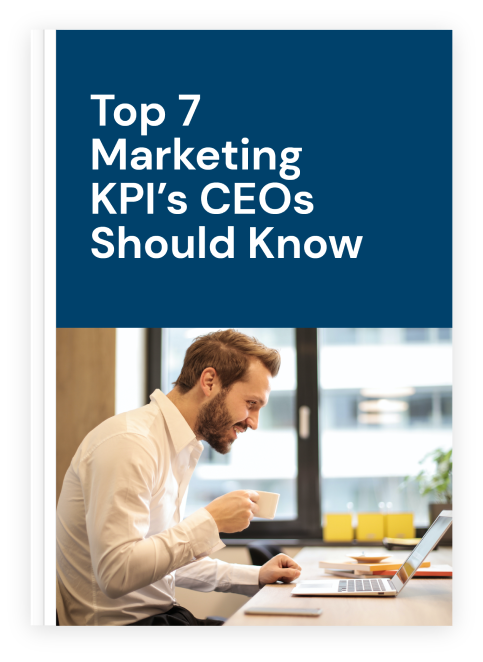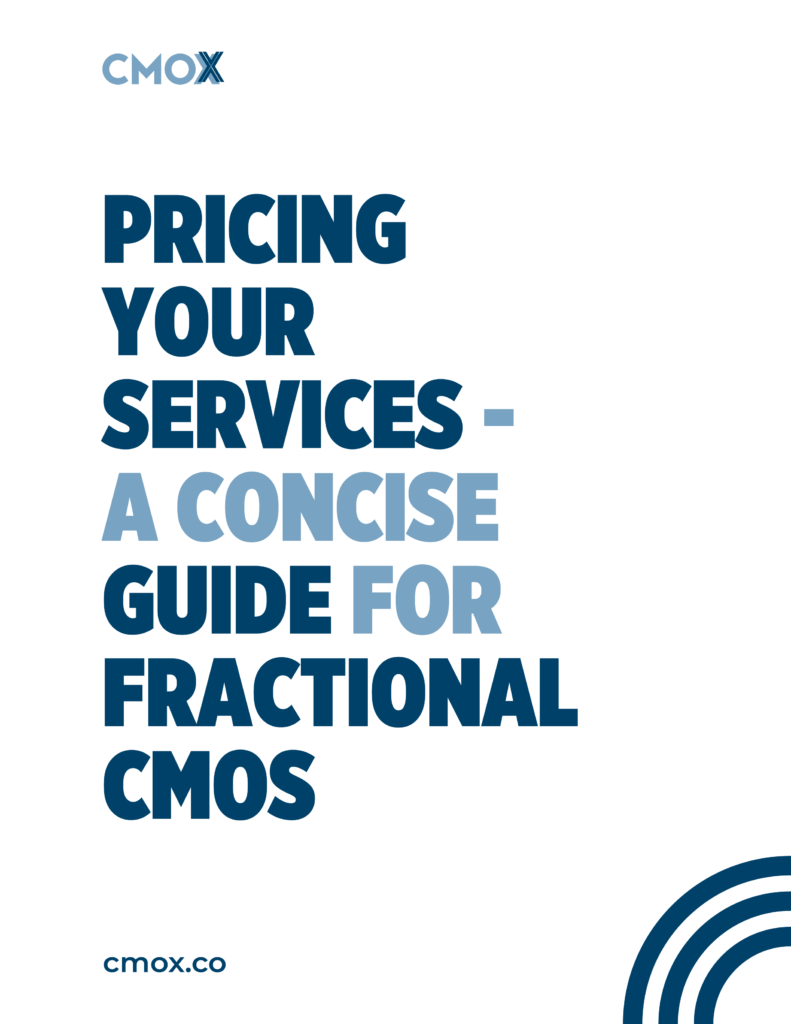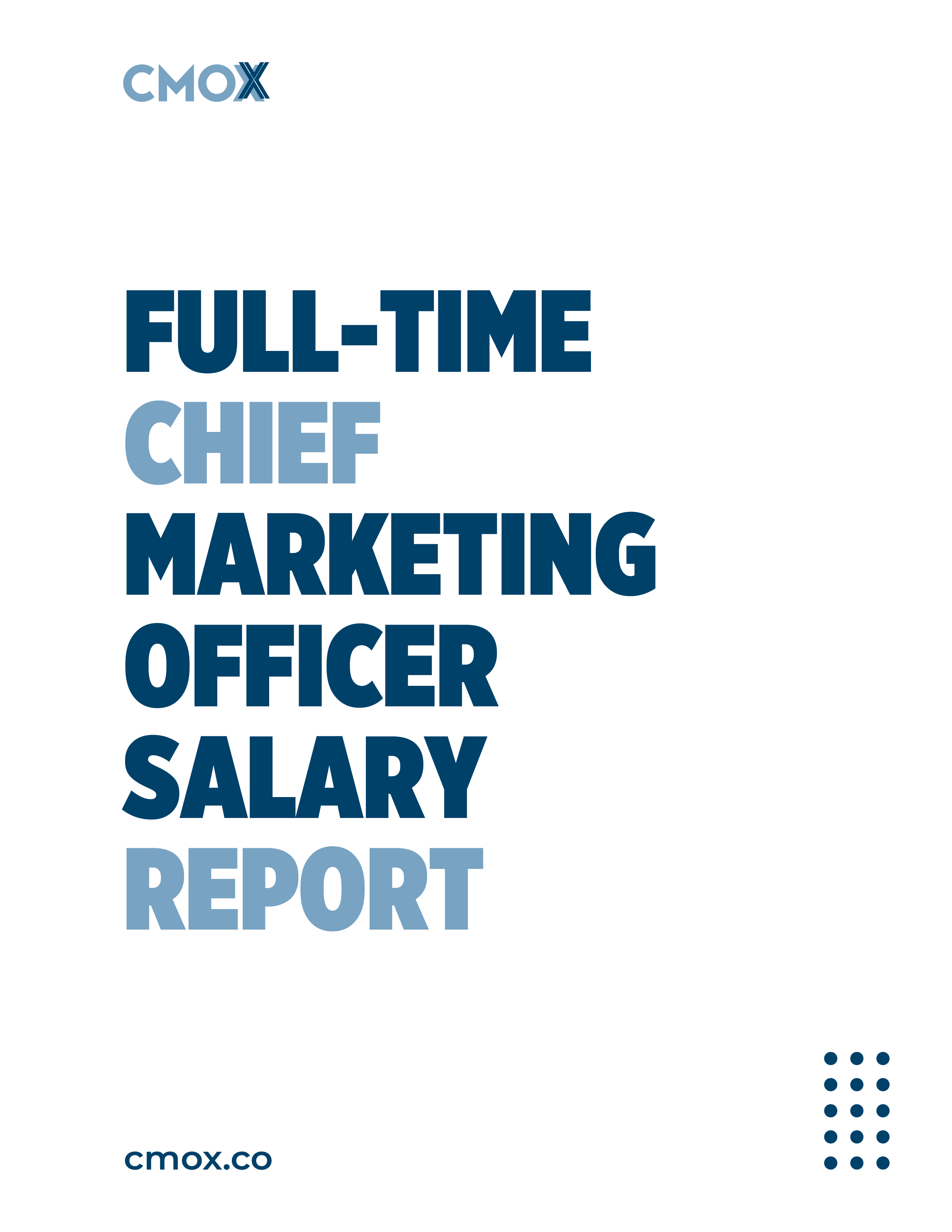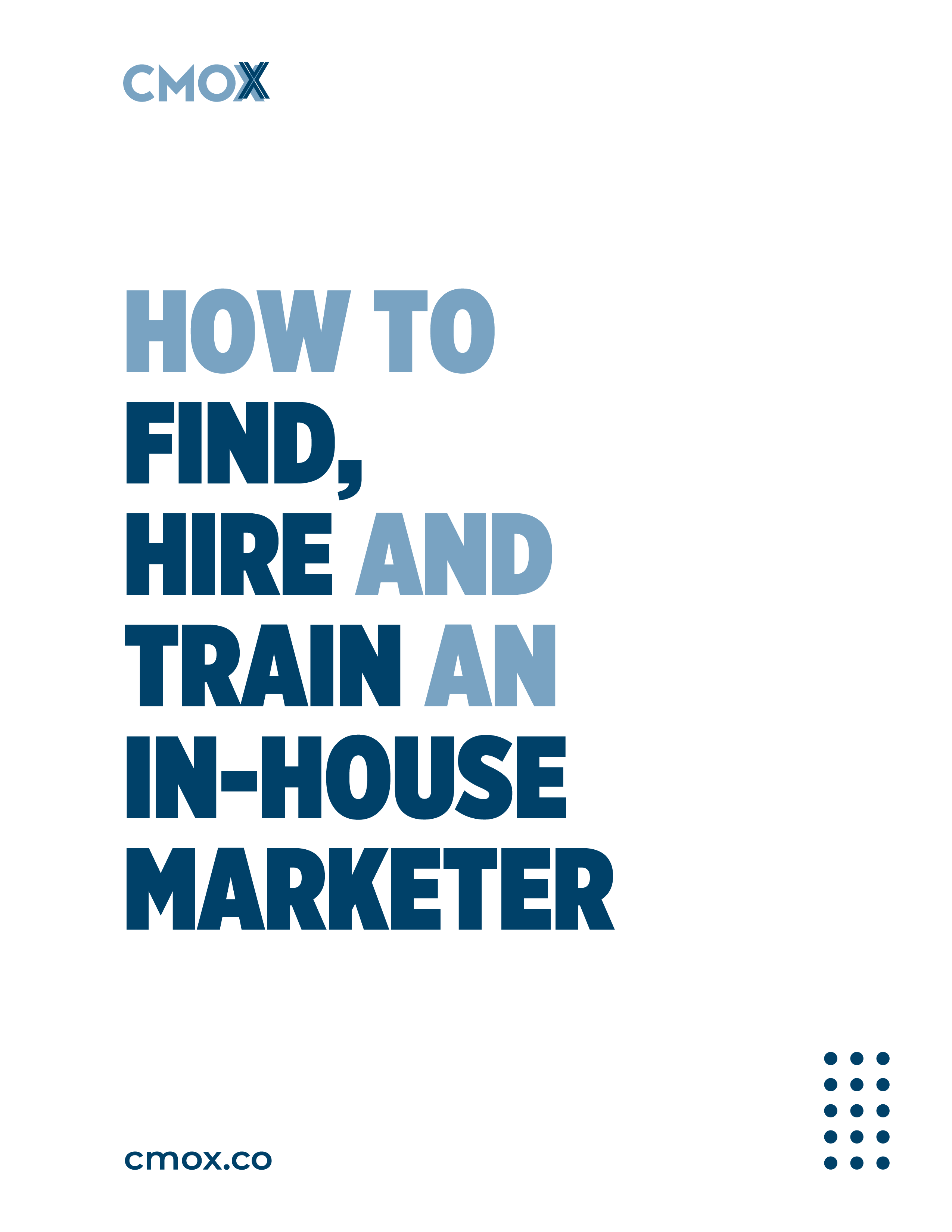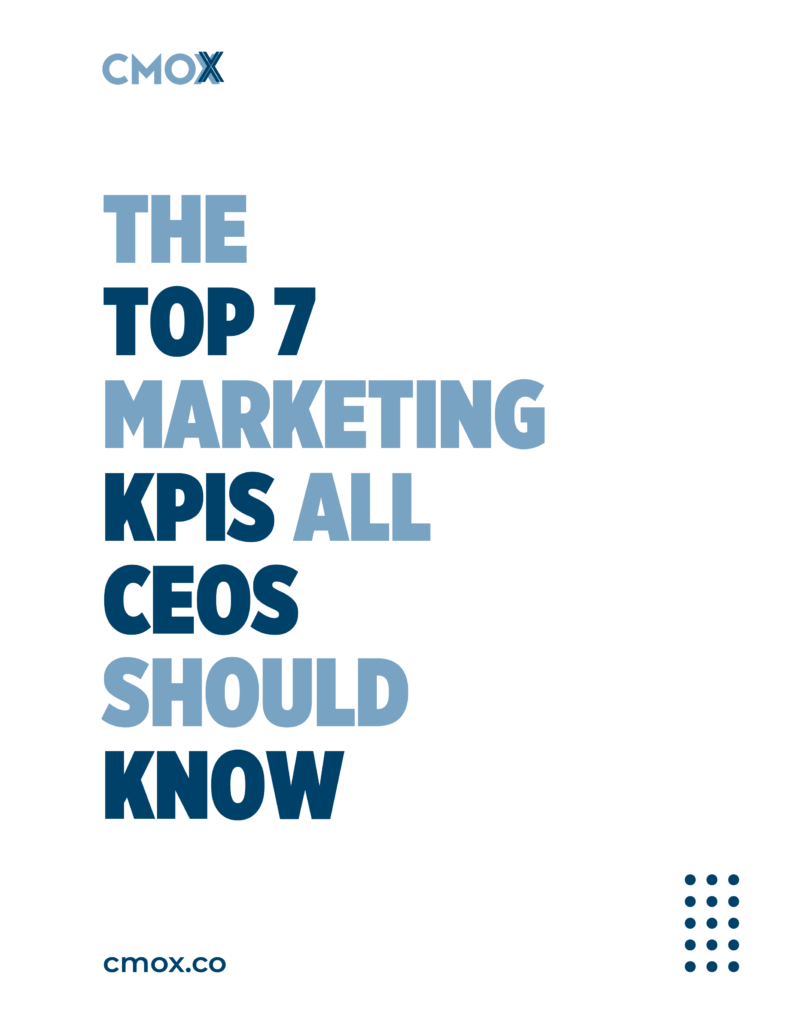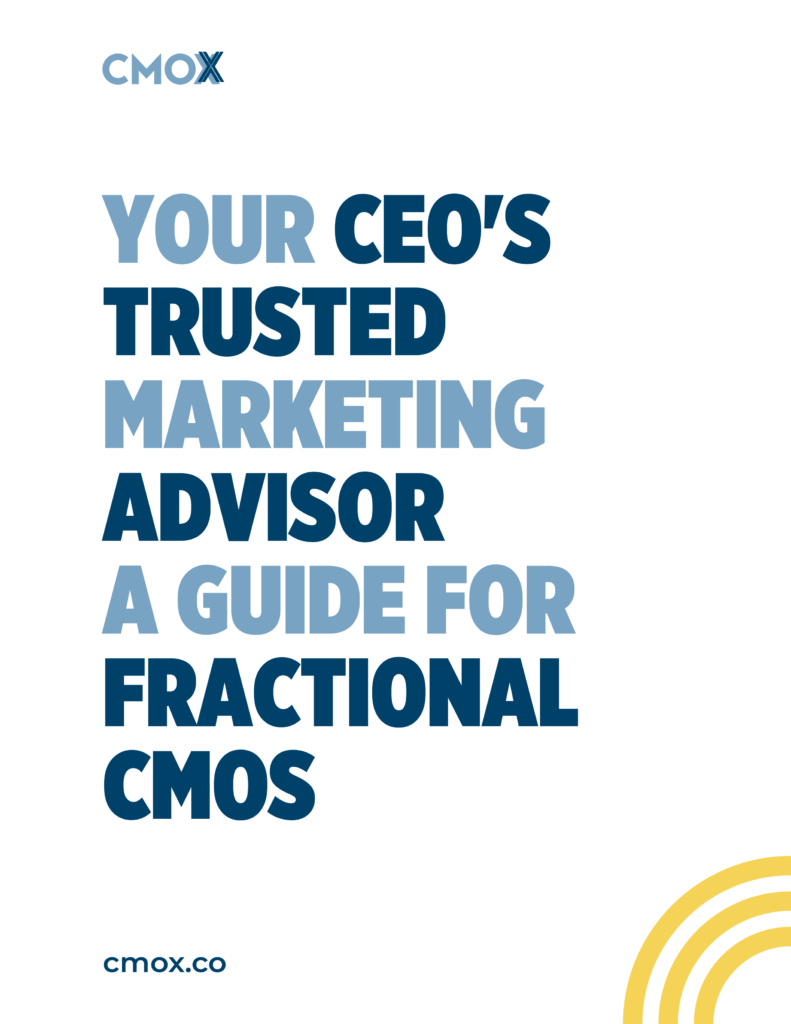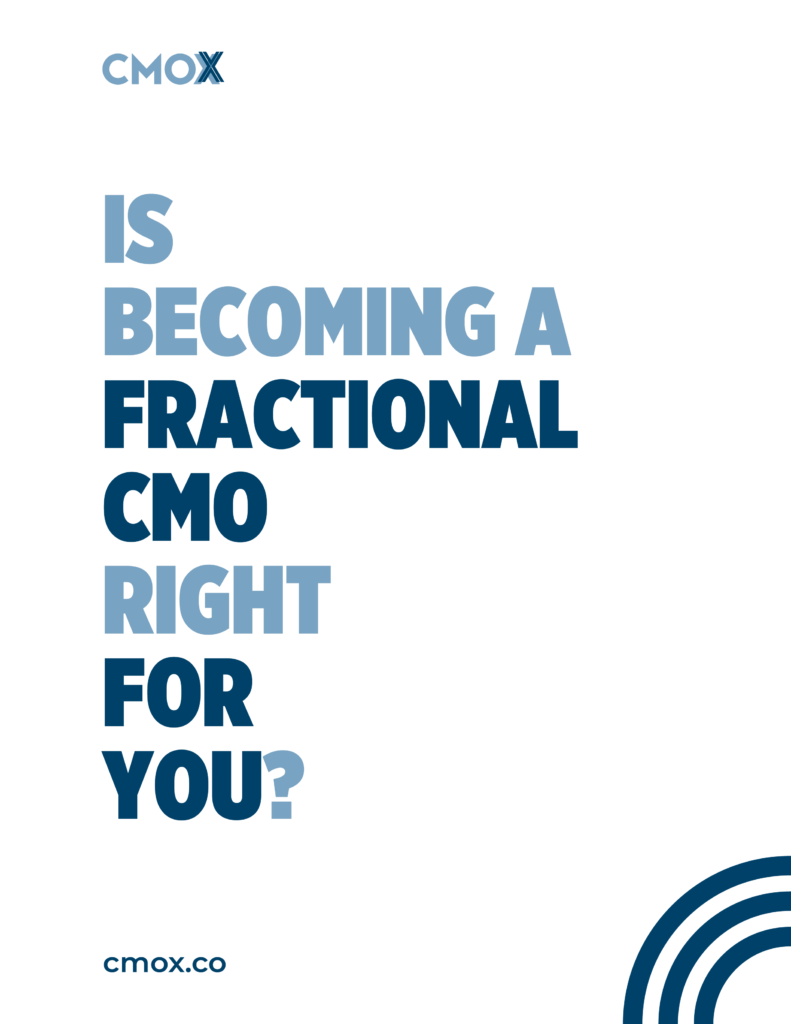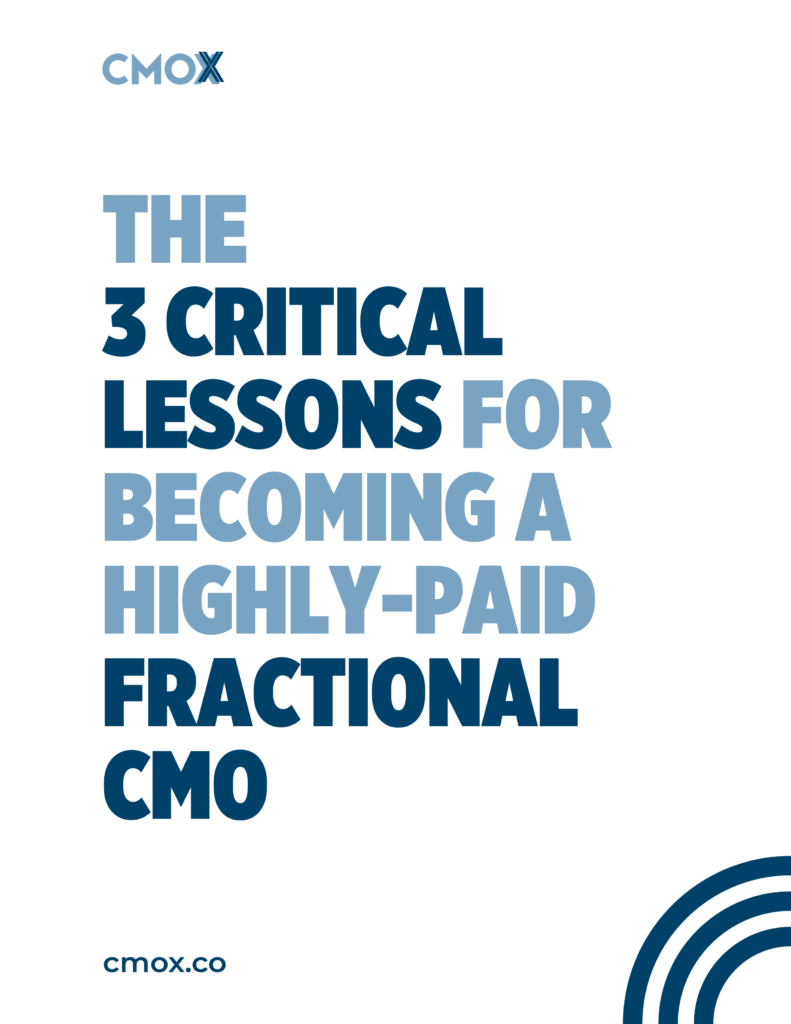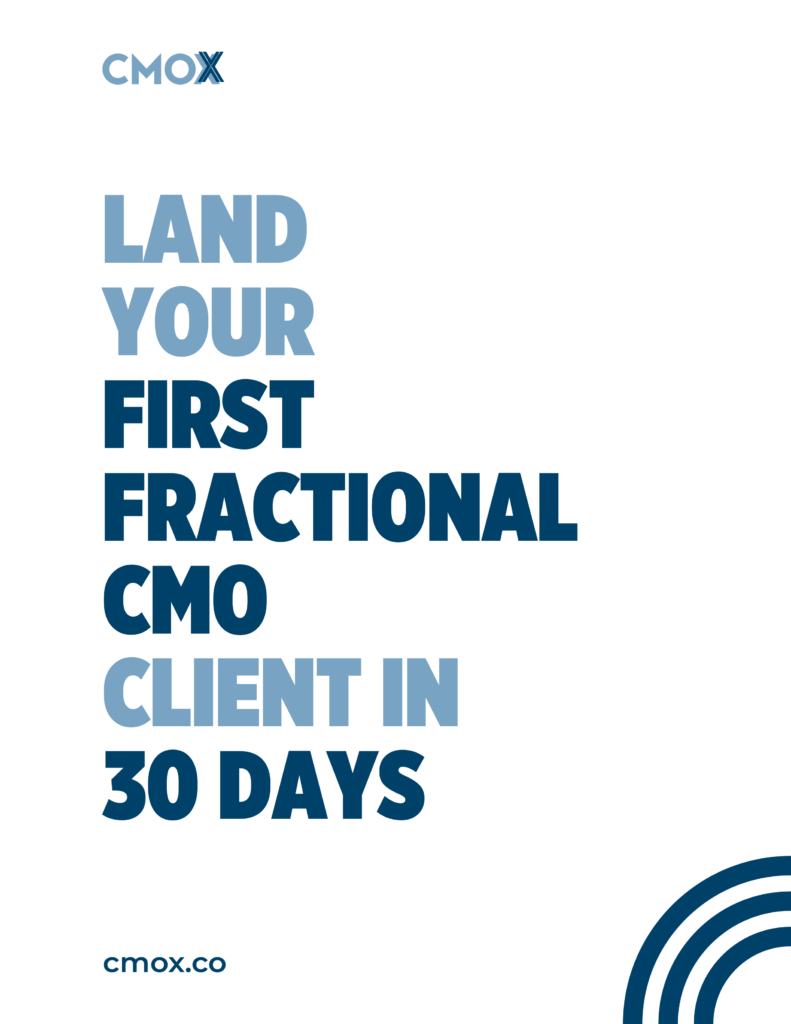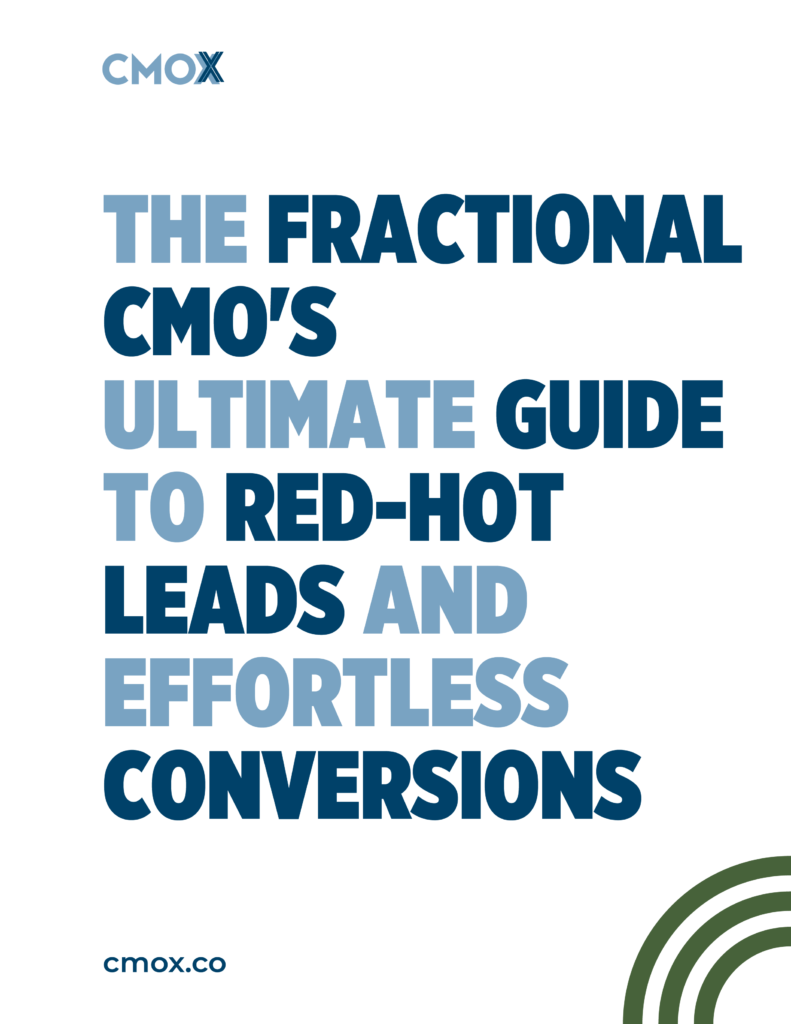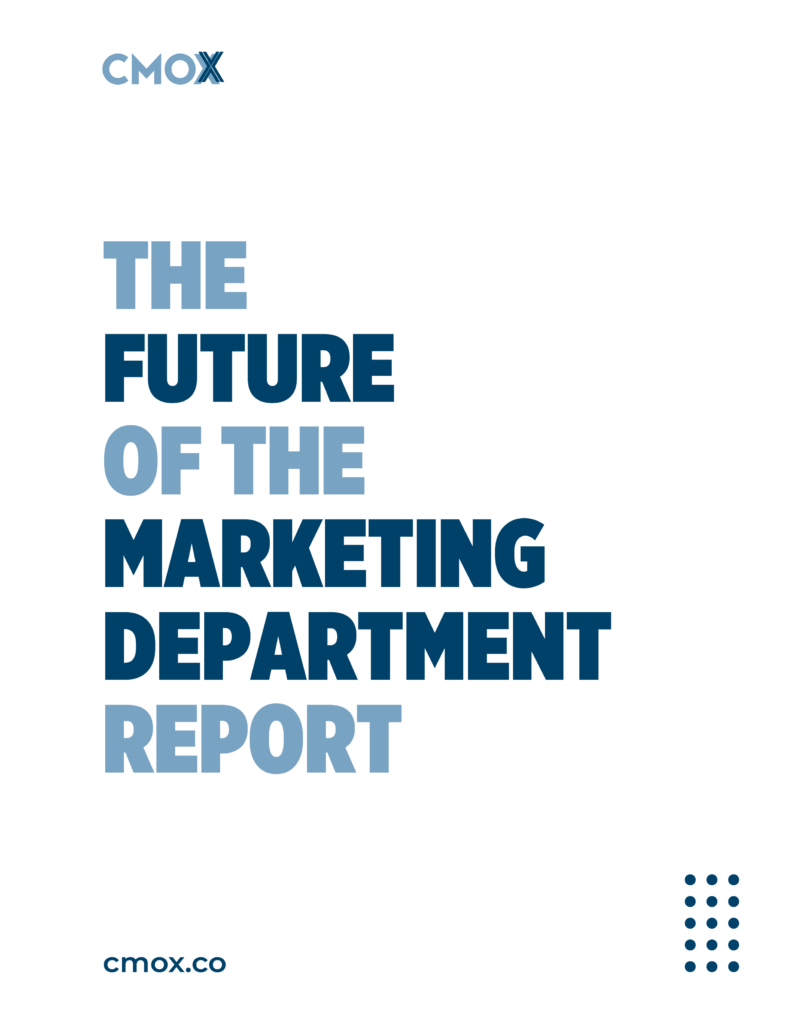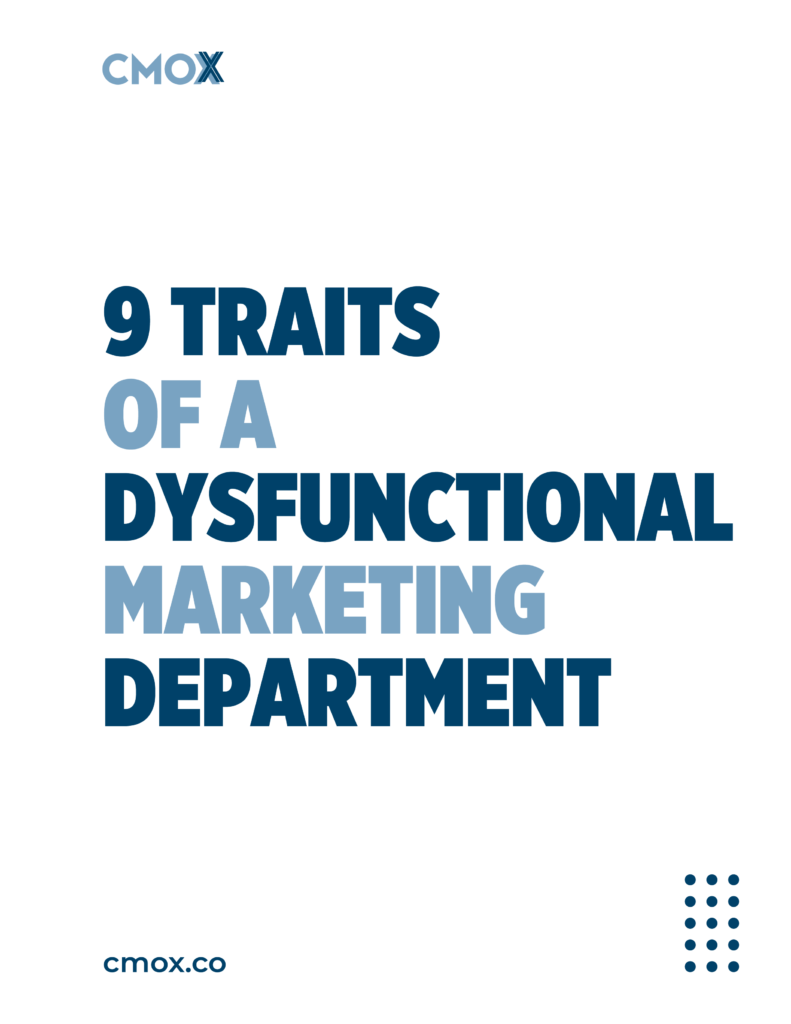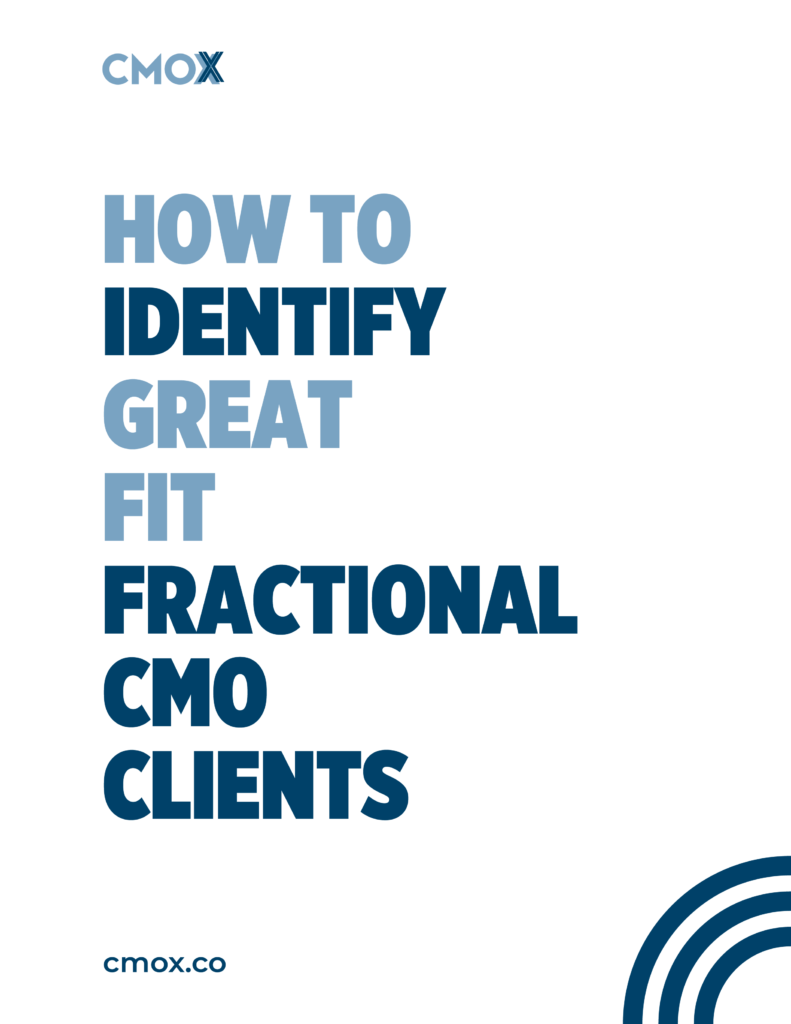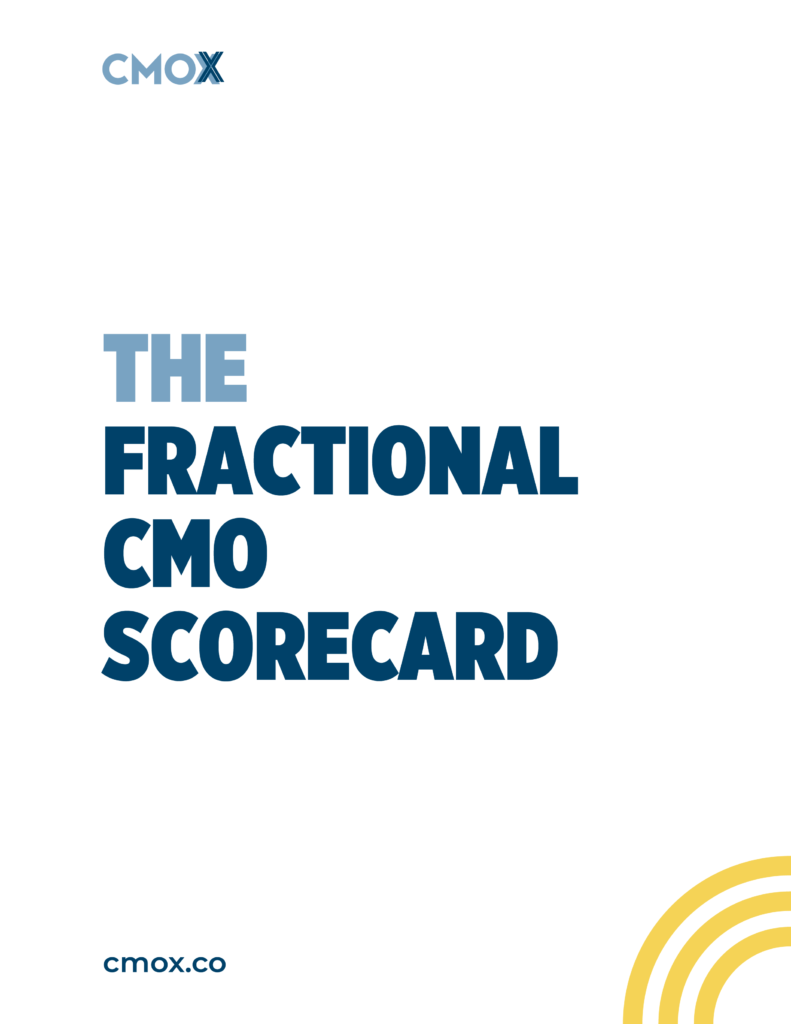Ep #90: $81k/mo as a Fractional CMO and Other Brain Upgrades

What if making $81k a month as a fractional CMO isn't the dream you think it is? In this episode of The Fractional CMO Show, Casey uncovers the hidden challenges behind high-earning solo practices—and how to build a sustainable, scalable business instead. From avoiding burnout to leveraging AI, structuring client engagements, and pricing your services for long-term success, Casey shares the playbook for thriving as a fractional executive. Don't just chase revenue—build a career that lasts. Tune in now!

Episode highlights:
What if making $81k a month as a fractional CMO isn’t the dream you think it is? In this episode of The Fractional CMO Show, Casey uncovers the hidden challenges behind high-earning solo practices—and how to build a sustainable, scalable business instead. From avoiding burnout to leveraging AI, structuring client engagements, and pricing your services for long-term success, Casey shares the playbook for thriving as a fractional executive. Don’t just chase revenue—build a career that lasts. Tune in now!
Here’s what we talked about:
- Why having too many clients in different niches leads to inefficiency.
- The challenge of context switching and why focusing on a niche is crucial.
- The evolving role of AI in marketing execution and business management.
- The downside of overspending on expensive tools and platforms early on.
- The shift from “fraction of the cost” to “everything you need.”
- How to structure marketing teams efficiently for growth.
- Selling outcomes, not hours—why hourly rates diminish your value.
Transcript:
00:00:00 Casey: In this episode, I’m going to dive into a few things that are on my mind, such as one of our members inside the CMOx Accelerator making $81,000 a month, and why you probably shouldn’t do that, and some other ideas that I want to get into your head so that you can do a better job selling your fractional CMO services. Let’s get to it.
00:00:20 Casey: Marketers of the world, why do we work hard to solve small problems? Why do we reinvent ourselves and our clients over and over? And why are we giving away marketing strategy for free? With advancements in AI, we’re all seeing the marketing department shrink from the bottom up, and companies need you to serve them as their fractional chief marketing officer. It’s time to solve bigger problems and bring home a bigger paycheck. It’s time to create the lifestyle we deserve and to make a greater impact.
00:00:52 This is the Fractional CMO Show and I’m Casey Stanton. Join me as we explore this growing industry and learn to solve bigger problems as marketing leaders. The Fractional CMO Show is sponsored by CMOx, the number one company to teach you how to attract, convert, and serve high-paying fractional CMO clients on your terms.
00:01:16 Casey: Hey, welcome back. It’s Casey. Let’s just dive right in. So, I got a WhatsApp message from someone in the boardroom. Boardroom is our most successful members inside the CMOx Accelerator. We’re in a WhatsApp channel, we do special meetings, and we just kind of chat because the experiences of people who are really successful as fractional CMOs are different than people winning their first client.
00:01:37 Casey: And one of our members shared that they just closed out February having built $81,000 in client billing. It’s nuts. And that’s monthly. And digging in, obviously, huge numbers. That’s like a million dollars a year as a single-pringle fractional CMO. There’s good things and bad things about that. I’ve seen a good thing, like, that’s pretty exciting that that’s possible. If you thought it’s impossible to make more than five grand a month as a fractional CMO, I could introduce you to someone who’s making a million dollar run rate as a fractional CMO. So, the ceiling is much higher than you probably have been led to believe.
00:02:17 Casey: Now, the way that this person’s doing it is that they have a lot of clients, and the downside is that the clients are in different niches. This is a case of just selling the person in front of you. And there’s nothing inherently wrong with selling people that you’re talking to on fractional CMO services. But at some point, the servicing of that work becomes really difficult, because it’s new, and different, and inventive, and you’re always changing things because no client is the same. And I’m speaking from experience.
00:02:44 Casey: At one point, I was working with four clients and they were all in different industries, solving different problems. Some B2B, some B2C; some high ticket, some low ticket. At one point, I was working with a company that was selling a B2B half-million dollar cannabis extraction equipment, that kind of thing. It’s big. It needed a forklift at least to lift it. It’s two storeys tall. It was big. And then, that same day, I would also have a conversation with another client who was selling… They had, we could call it a direct-to-consumer SaaS company, and the average subscription cost was $3, $5 a month.
00:03:25 Casey: Think about those marketing strategies–radically different. At that time of my life, I was pleased because I had two companies paying me well. So, that was cool. But man, it was hard. My lunch break, I’d be like, “What am I going to do on this next call? 0% of what I just said, can I go say to this other client and help them?” It has to be all different; all inventive.
00:03:46 Casey: And then you mix that with a couple other clients and your life actually becomes a little stressful. And it’s fine. You don’t even have to believe me that that’s not a great place to be. You can just go experience it yourself and go win clients outside of any similar genome, and experience just how difficult it can be. How much you feel like you’re chasing your tail, trying to figure stuff out, and then you’re going to sell clients that don’t have the money for implementation.
00:04:11 Casey: So then, you have to do some of the implementation, and then you start hating the client because you have to do implementation and you stay up late. It’s like, Sunday night, if you stay up late and you work really hard, boom! Come Monday morning, your inbox is clear; you feel good. Come Monday at 5pm, your inbox is flooded again and you’re back to another week of stress.
00:04:27 Casey: So, having a lot of clients in different niches, not the right place for you to be long-term, where I want you to be. And I know I’ve got other folks that listen besides marketers. I know I’ve got fractional CTOs, CFOs, all y’all. Thanks for being here. You want three to five clients. That’s it. Three to five clients is what you want. If you have too many clients, you’re going to burn out. You’re going to burn out because it’s hard. Not that the work’s hard, but the context switching’s hard.
00:04:55 Casey: Have you heard of Dunbar’s number? Keep that one in mind. Dunbar’s number states that, and I’m going to get this probably a little wrong, but the basic idea is that you can have meaningful conversations with about 150 people. If you bump into about 150 people in your life, your parents, your siblings, your friends, your high school buddies, your college buddies, previous coworkers, 150 people is your limit of remembering enough about them to have a meaningful conversation. Beyond 150, you just start getting a little soft. You forget stuff. That’s when you have to have lines that kind of pretend that you remember them, right? And it’s tough when you just start working with too many different people to have real relationships.
00:05:41 Casey: So for that reason, I think three to five clients is really the ideal for a fractional C-suite. So for fractional CMOs, three to five clients paying you between three and 15 grand a month or more. And if it’s more, it’s likely with upside. Rarely does someone charge more than 15 grand a month in cash. In monthly fees, they would charge maybe 10,000 or 15,000 a month. And then, they would get an upside on that. That’s a possibility. Just don’t do any upside until you have enough money coming in that you cover your nut.
00:06:12 Casey: So, hitting $81,000 a month, hitting a million dollars a year run rate as a fractional CMO is amazing, and that member needs to be pretty damn proud of themselves. But they solve for money, and now, they need to solve for time. They need to reduce their time. They’re working way too much. They said they’re super stressed and they’re not sleeping well. They have to solve for time.
00:06:37 Casey: And when do you do this? When do you hire an assistant? Do you hire an assistant before you need them, and take money out of your own pocket and pay them? Or do you hire them after you need them? You can’t hire them the moment you need them. The ship sailed at that point. They’re going to be late to help you. When do you hire them? And it’s a question for you, and it’s kind of like where you are and what you want to do.
00:06:58 Casey: I hired Raphael in my team when I needed help, but I didn’t know what I needed. And he was super helpful, and we still work together, and I adore the guy. And it was useful to have an assistant to support me on these calls. Now that I’ve taken on a couple of clients here over the last few months, I’m at a point of asking, “Do I want an assistant?” And I have a couple good candidates. I put a job post out and I have some good candidates that have raised their hands. And I think at this point, the answer is no, I don’t want an assistant.
00:07:32 Casey: And why don’t I want an assistant? I think AI is good enough to help me, and if I can be really choosy about my clients, I probably don’t need an assistant. It’s not like I’m against spending the money on an assistant. Assume the money is forgettable, I don’t need the extra $2,000 for a full-time offshore assistant or something like that, or more if I want to pay for someone local. I mean, it’s nice to save the money, but I just don’t know if I need it at this point.
00:07:59 Casey: You might need it, you might not. It depends on who your clients are. I’m trying to find my way into working with great clients where I just don’t need an assistant. We’re like me showing up and doing my thing, and then leaving, like that’s enough. It’s self-contained. I don’t have major follow up afterwards. So, you may want an assistant, you may not.
00:08:18 Casey: I think, with this member who’s doing $81,000 a month, it’s like they need an assistant because they’ve gotten themselves in a place where they just need an assistant for their client load. And it probably makes sense to maintain as many of those clients as that person can, for as long as they can, just to keep that revenue up. $81,000 in a month is a lot of money, but if you burn out in 30 days or 60 days, it’s not that good. Would you rather be making half that and be really sustainable? You know, maybe.
00:08:48 Casey: So, just as a consideration, I don’t want anyone to take on eight, nine, 10 clients over the course of two months. That’s crazy. It’s a lot of work. So what do I think you should do instead? I think you should just aim to take on one client a quarter. It’s a calm approach. It’s an approach of one new client a quarter, one new big problem to solve every quarter. And then at some point, after a year, you’ll have enough clients, you’ll be fully booked out, you’ll be making great money, and then you’ll say, “What’s the client I like the least?” Or “What’s the client that’s the most work?” Or “What’s the client that feels like I’m just pulling teeth? Maybe I’m gonna replace them with someone else.” Or maybe you go find an opportunity where there’s a big upside.
00:09:32 Casey: So I think that’s a way that you can be relevant and useful, and increase your income and not get overly stressed. I think some people want an assistant. They want that support. I just really think in 12 months from now, in 2026, man, I just don’t know if assistants are as going to be as needed if we have just good AI tools. I think about ChatGPT Operator and what that can do. I think of computer use from Claude. And I just think they both are terrible, almost unusable. They’re so slow and clunky. But how long is it gonna take for those tools to be really useful?
00:10:10 Casey: And if you’re wondering what I’m talking about, this idea, this notion of computer use in AI, it’s as if you had a computer that was open up at your desk, next to you. Claude does it like “I’m your desktop. If you use Docker, you can spin up a Docker image,” is that the right way? An environment. And then it can operate. So, that.
00:10:27 Casey: If it’s ChatGPT, you go to https://operator.chatgpt.com/. It’s 200 bucks a month, and it’s a web browser, and you can take over and you can go log into your email, log into your CRM, whatever, and then you prompt it in a left window pane, and you say, “Go do these things when these things happen.” And it just monitors for you or does the work for you. It could go to your email and look for something, and then copy the content and put it in a Google Sheet, or edit to the CRM, or whatever.
00:10:54 Casey: That’s here today, and it’s clunky. But that’s not clunky for long. It’s going to be really important soon. I think I’ll have an AI operator supporting me very soon. I mean, as soon as possible. And ChatGPT’s Operator is 200 bucks a month and Claude’s computer use is part of their $20 a month package, but you have to pay for credits. It doesn’t matter. It’s going to be incredibly inexpensive soon, much cheaper than spending a couple grand a month on an assistant.
00:11:28 Casey: So, I just think that’s happening. I think that’s interesting. I want to build a business where my fractional CMO clients are me showing up and me on meetings, and just doing that strategy and leadership stuff is enough, and there’s not a bunch of additional follow up. An assistant kind of helps with that additional follow up. So, I think you could live a life where you don’t have an assistant. If you have an assistant, probably makes sense to keep them. So, just a consideration. That’s where I see things are going. It’s sharing how I’m thinking about things.
00:12:02 Casey: The next thing I want to talk about is just a reminder that I want you to have staying power here as a fractional CMO. So, one of the ways that you have staying power is that you just keep your costs relatively low. A lot of people, when they start a business, they’re going to go sign up for all the tools. They’re like, “I’m gonna sign up for a HubSpot because their CRM is amazing and it’s free or cheap.”
00:12:22 Casey: Yeah. But then, when you want to start sending emails, HubSpot is super expensive. And if the fractional CMO thing doesn’t work out, when you’re on your own for after a couple of months, you’re probably going to just sunset those costs. You’re gonna cancel your subscriptions. And that just puts you in a terrible place where you don’t have the tools and you got to go learn a new tool stack. And instead of having consistency, you’re wasting time.
00:12:43 Casey: So, I just want you to think through how do you build your fractional CMO practice on as a shoestring of a budget as possible so that it persists forever? That’s it. So it persists forever. I mean, I’m talking like I’d rather build a WordPress site and have a $5/month GoDaddy hosting plan than have a Squarespace site where I’m spending $15 a month. Those little things matter when you get started if you’re cost-conscious about that stuff. And even if you’re not cost-conscious, making a decision early on to have good lasting tools that aren’t the most expensive, I think, is a smart move.
00:13:23 Casey: I want you to stay in the game as long as possible. There are plenty of examples that I can think of; of CMOs who have given up too early, and they were just on the precipice of it. They could taste the win, and then, they just gave up. And I just think of the market and where things are going and the answer is the fractional CMO. For us, marketers, the marketing department is shrinking. Like I said in the intro, it’s shrinking from the bottom up, and that means that the CMO is needed more than ever.
00:13:53 Casey: So, I just want you to think, as you build your practice, keep your costs low, get support, get shortcuts, try to build your practice without just investing a bunch of money in the top tools. You win no points for having the most expensive tech stack, and there certainly are CMOs that try to do that. You could just get started with a cheap email service, a cheap CRM pipedrive, that kind of stuff. You don’t have to go crazy here. Just keep it really simple. I started with Google Sheets, you know. So, you don’t need anything fancy.
00:14:25 Casey: Staying power is critical. That’s the most important thing. If there’s one thing to success for the CMO or the fractional executive, it’s just staying power. Build a business that can withstand anything that happens in the market. If crazy stuff happens with Trump, I mean, we’re seeing the stock market fluctuate based on these tariffs that got enacted. You know, all that stuff’s happening.
00:14:50 Casey: We could be entering a tough time. We could be entering a great time. I don’t know, I’m not Nostradamus. But what I do know is what I can do for myself and my family is keep expenses low in the business. As you start a new fractional CMO practice, keep your expenses low, so that you can weather any storm. I don’t want you to have to throw away your website that you toiled over for a couple of weekends just because the cost got to be too much and you weren’t making any sales because maybe you were on the cusp of making a huge life-changing sale, okay? So, just keep your costs low, so that you can increase your staying power.
00:15:23 Casey: And the third thing I want to talk about here is I was just interviewed by the Association of National Advertisers, and they’re like, “What’s this whole fractional CMO thing about?” And there’s just two components of it that I want to bring up that I think are important for you.
00:15:39 Casey: So, the first one is the role of the marketing technician and why I think it’s so critical. What I think of most companies, the companies that I have the most experience with, like sub-$100 million a year companies, my experience is between two and $100 million a year. That’s my sweet spot. North of $100 million a year, not really my place. I don’t really know it well. But two to a hundred, that’s my wheelhouse. And I think of those companies and I think of the marketing department and the talent that they have and what they need, and it’s clear to me that the fractional CMO lays out the strategy and provides the leadership, but then the work has to get done by someone.
00:16:16 Casey: And who’s the someone? Well, I call it a marketing technician, and that technician is armed with AI tools. They have a subscription to ChatGPT and to Claude or whatever, Perplexity, Lex.page, whatever makes sense in the business. Maybe a copywriting specific one, like Jasper, whatever. But it’s a person who’s working full time in the business, 40 hours a week, that’s the marketing technician, and they’re executing on the campaigns of the CMO.
00:16:47 Casey: And I’m just like, “Really?” If I get a smart person in a company, give me one good smart person who’s interested in the work that we’re doing, committed to it, and willing to grind and work hard, and I get to tell them, “Do these campaigns. Focus on this. This is what the scorecard looks like. This is what the campaign looks like when it’s executed correctly,” I can get a lot of good done with that one person.
00:17:11 Casey: Give me two of those people, give me five of those people, man, it’s a powerhouse. It’s my strategy, clarity, KPIs, rolled down to outcomes for the individuals. They own it, they build it out, maybe they have to research, maybe they have to ask ChatGPT, maybe they have to go to HubSpot and study the university there to learn how to use HubSpot, whatever. But I delegate outcomes to them and then they generate the outcomes. It’s just a bulletproof system that we can create inside of businesses. And if I ever leave that company, that company’s way better off. They still maintain the employment contracts with those marketing technicians.
00:17:50 Casey: I say marketing technician because you probably don’t need a director in the role. You probably don’t need a manager in the role, like a marketing director or a marketing manager. Yesterday, I was just looking for salary comps for marketing director, and they’re expensive. I live in Philadelphia. That’s upper $100,000 to low $200,000 a year role. And what are they directing? A lot of companies don’t have enough for them to direct. They’re over titling someone, and it just doesn’t make sense.
00:18:24 Casey: This notion of over titling people is crazy. If you give someone a title, if you give your finance person the title of CFO, they’re going to go on Glassdoor and figure out what a CFO should cost and they’re gonna say, “Hey, why is my salary this and not that?” So, we want to maintain intelligent titles for people that are based on the work that they’re actually doing. I’m not saying to under title people, but I am saying don’t over title someone. So a marketing technician can do the same work as a lot of marketing directors and marketing managers, but it’s with a title that’s the right size to them, and therefore, we can spend the right amount.
00:19:03 Casey: So, I shared this with the Association of National Advertisers. And my other beef with this… I mean, my big beef with what I’m seeing in the fractional CMO space, I see it with MarketerHire and I see these two mantras that people keep saying. They say, “The future is fractional,” which feels kind of flat to me, whatever. And then the other one is they say, “For a fraction of the cost.” And it’s like, for a fraction of the cost, I could go to Whole Foods and I could get dip ingredients to make dinner for my family or I could go to the Dollar Store and get dinner for a fraction of the cost.
00:19:13 Casey: Do you see the difference here? I don’t want you to sell at a fraction of the cost. I think it’s the wrong mentality, and I think it’s the mentality of people who are well-meaning, but they’re trying to help their clients and they’re like, “I’m going to save you money.” And my job isn’t necessarily to save clients money; it’s to make them money.
00:20:05 Casey: So what I like is we’ve got a member in the accelerator and she is a powerhouse. She charges, you know, her full-time salary was like $500,000. Really solid marketer, really smart. Well, what should she charge if she gave a quarter of her time to somebody? The way I look at it is she’s not available to work for that company. This company wants to hire her, but they simply can’t afford her. They can’t afford a half million dollars a year.
00:20:34 Casey: So she says, I’ve got a deal of the century for you. I’m gonna give you all the marketing strategy and leadership you need. That’s gonna cost you half of what I would otherwise make. It’s gonna cost you 20 grand a month, 15 grand a month. Now that’s a scream and deal for them. It’s not at a fraction of the cost. It’s all that you need at the appropriate cost. I’m not trying to cost compete. I talked to someone recently and they’re like, “That’s the rate? I could hire a full-time CMO for that cost” It’s like, “Yeah, you could.”
00:21:05 Casey: But there’s a difference between a Ferrari and a Pinto. They both get you to the same destination, but one’s obviously faster and better built. So I don’t play the game of justifying fees. Oh my gosh, you charge a thousand dollars an hour? I mean, if you want to do math on that, I guess, do you want me to spend twice the amount of time and get you the same result? How silly is that game? I don’t even try to play in that like cost per hour gain. I don’t like cost. I like outcome. I like focus. I like momentum.
00:21:42 Casey: The companies I wanna work with are those that are moving quickly. And they’re like, “Whoa, I can’t afford Casey. We literally can’t afford Casey full time. Or if we could afford it, we’d have no money left over for marketing. But we can have Casey’s best ideas, his strategy and him building and leading the team.” Amazing. And we’ll have money left over after that to run advertising, to bring in marketing technicians, like that becomes exciting. So sell this idea of the marketing department becoming lean, mean, focused.
00:2017 Casey: If two companies are selling the same thing, they both sell the same widget, they both sell whatever. The company that can spend the most to acquire the customer wins. How are you able to spend more money than your competition? Well, because you have lower overhead or it’s cheaper to produce the product or whatever. Let’s assume the production of the product is the same. shipping is the same, right? What can we change? We can change overhead cost, full time CMO, you know, company is full time CMO, company B, fractional CMO.
00:22:50 Casey: Now there’s a delta in cost that can, boom, go down to the bottom line and either to be taken as profit or thrown into advertising to acquire more customers. That’s the game we want to play, not the fraction of the cost, but all that you need. And you just don’t need full-time. That’s it. That’s why I think the term part-time CMO is bad. If you were at a company and someone’s like, “Hey, what about that person?” You’re like, “Yeah, yeah, they’re the part-time, they’re the part-time whatever.”
00:23:21 Casey: You probably think that like, there’s a full-time person and that full-time person is maybe better or something. I don’t know. Part-time to me feels like it diminishes their value. It says like full-time would be better. To me, fractional is comprehensive. Like fractional is all I need. It’s in this package, it’s everything I need for the role. The fractional CFO, the fractional CTO, the fractional CMO. Do I need in my company at CMOX, a full-time CFO? No, it’s a very simple company, right? So I need a fractional CFO who can come up with big numbers and charting and all that kind of stuff.
00:24:00 Casey: I don’t need a full-time. Like if someone was like, hey, I’m a full-time CFO, can I come work for you? It’d be like, no, I just don’t, I don’t need that. I don’t need 40 or more hours a week of that. There are rules that I need 40 or more hours a week for, but it’s not the CFO. So with the CMO seat, you’re not selling at a fraction of the cost, you’re selling everything you need, and this is my rate. It’s a nuance, but it’s important that you pick up on that nuance.
00:24:29 Casey: I think failure to pick up on it means that you’re just going to be squabbling over clients that are fighting about your costs. And again, like my costs are my costs. That’s just what they are. It’s binary. You can either pay for it or you can’t. And if you can’t, that’s fine too. Just like, let me know so I could move on. You set your rates. And I’ll just give you this parting thought. If you have any clients that you’re talking to, prospective clients, and you’re like coming up with unique packages for them, you’re doing it wrong. You’re just doing it wrong.
00:25:01 Casey: You want to have like three things that you sell. It’s a menu of three items and you have a price. And once you build the confidence and you win a client or two, then that price increases for the next client. And then it increases for the next one that increases for the next client. That’s how you play the game. You don’t really charge your current clients more for the same work that you’ve been doing. You kind of lock them in you’re just done. Boom, you’re locked in. If you want to charge more, you just get another client that pays more than that first client.
00:25:26 Casey: Or you cycle out the client that you don’t like or whatever with a higher paying client or an easier client or a more fun client or a client with a bigger upside or whatever. So I think that marketing is getting more complex. I think that companies more than ever need the CMO. I was recently on a call with a big company. They’re doing eight figures and very cool company. And they were like, we want a marketing manager. And I was like, you don’t want a marketing manager actually. And here’s why.
00:25:56 Casey: Because the marketing manager will do what? Marketing strategy, leadership and implementation, which of those three are they not gonna be great at? Cause I’m not great at all three. I’m a pretty good marketer. In order to implementation. I’m just not great at it. Strategy and leadership, I’m the guy. Implementation, eh, not very good. So if I was the marketing manager working 40 hours a week, I could do marketing strategy and leadership.
00:26:20 Casey: But when it came to implementation, wouldn’t be so good. Marketing managers can’t do all three. It’s just impossible. You get to choose two. Marketing strategy, marketing leadership, marketing implementation. So sell that to your clients. That’s what they want. You might have to share the good news to them that fractional CMOs are a thing and that you consider one. And maybe they should consider you. But I really think that it’s the best thing for the clients. They get the right strategy from someone who’s experienced, who gets it.
00:26:48 Casey: They have to pay a premium for that, but it’s not nearly as expensive as the full-time CMO. Then they have the confidence to move forward in building out the marketing technician roles, getting them to do the work, and then ultimately reaching the results in the business. So I’m as committed as ever to this. This is the future of marketing. Yeah, this is it.
00:27:07 Casey: So thank you for being here. Join our free Facebook group. I just did a great live like a week ago at cmox.com/community. It’s our free Facebook group. That was fun. We just did like hot seats, helps people kind of get in position to win their first client. And then we’ve got the accelerator. And the accelerator is awesome. We have a ton of fun in there and people are putting up some big numbers right now. If you want to learn more about that, you can book a call at cmox.com/call and book a call with my team. All right. All right. See you soon. Bye.
00:27:37 Casey: Thank you for sticking around for the full episode. As you know, learners are earners, but you’ve got to take action on what you heard today. For more information and show notes, visit fractionalcmoshow.com. If you’d like me to answer your questions on an upcoming episode, you can share your question at fractionalcmoshow.com. And last, please hit the like and subscribe button so that I know that this content is helpful to you. Alright, go get em!
Join Our Community
We are excited to announce the Fractional CMO Community Facebook Group. This aims to be a place where Fractional CMOs or marketers considering becoming a Fractional CMO can connect and share ideas.
Locations CMOx® serves
- New York
- Philadelphia
- Los Angeles
- San Francisco
- Chicago
- Houston
- Dallas
- Austin
- Miami
- Atlanta
- Denver
- Boston
- San Diego
- Seattle
- Portland
- Minneapolis
- Milwaukee
- Detroit
- Phoenix
- Washington D.C.
- St. Louis
- Toronto
